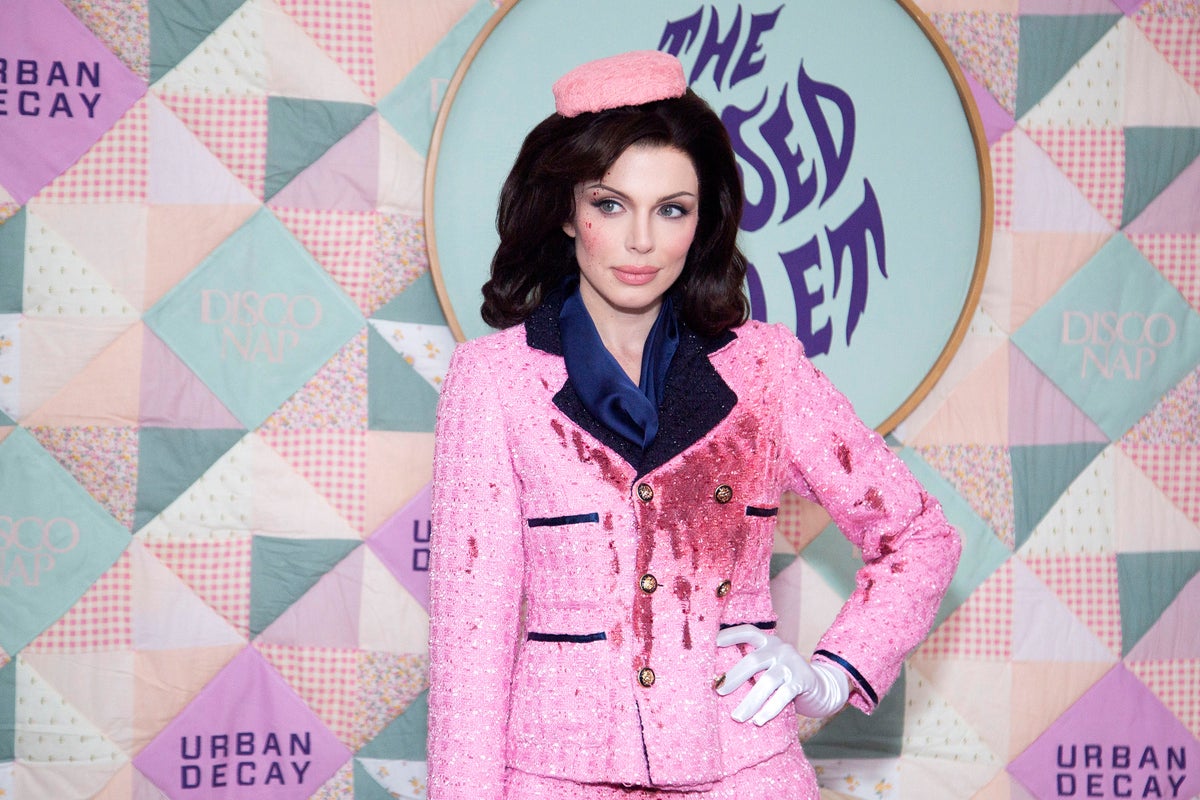Julia Fox’s Jackie Kennedy Costume: A Disturbing Reflection of Trauma and Power That Divides Public Opinion and Ignites Outrage
Julia Fox’s recent costume choice, depicting the iconic Jackie Kennedy, has sparked a firestorm of controversy, igniting debates about the boundaries of artistic expression and the ethics of cultural representation. The backlash intensified when Jackie O’s grandson publicly condemned the decision, labeling it as “disgusting, desperate, and dangerous.” This incident raises critical questions about the intersection of celebrity culture, trauma, and the legacy of historical figures, particularly those who have endured significant personal and public tragedies.
Jackie Kennedy, the former First Lady of the United States, is a figure whose life was marked by both glamour and profound sorrow. Widely admired for her poise and style, she became an enduring symbol of grace under pressure, especially following the assassination of her husband, President John F. Kennedy, in 1963. Her life story is one of resilience, navigating the complexities of public life while grappling with personal loss. The portrayal of such a figure in a costume context inevitably invites scrutiny, particularly when the representation may be perceived as trivializing her experiences.
Fox’s assertion that her costume is a commentary on “trauma and power” adds another layer to the discussion. In contemporary society, the idea of using art and fashion as a medium to explore complex themes such as trauma is not new. Many artists and designers have sought to challenge societal norms and provoke thought through their work. However, the effectiveness of this approach often hinges on the sensitivity with which the subject matter is handled. Critics argue that Fox’s choice may lack the necessary depth and understanding of Kennedy’s legacy, reducing a multifaceted figure to a mere costume for shock value.
The backlash against Fox’s costume also reflects a broader societal trend where public figures are increasingly held accountable for their representations of historical and cultural icons. In an age where social media amplifies voices and opinions, the line between artistic expression and cultural insensitivity can become blurred. The outrage directed at Fox can be seen as part of a larger movement advocating for respect and sensitivity towards those who have experienced trauma, particularly when it involves figures like Jackie Kennedy, whose life was irrevocably altered by tragedy.
Moreover, the reaction from Kennedy’s family underscores the personal stakes involved in such representations. The descendants of historical figures often bear the burden of their relatives’ legacies, and their perspectives can provide crucial insights into how these legacies are perceived and interpreted by the public. The condemnation from Jackie O’s grandson serves as a reminder that behind the glamour of celebrity culture lies the reality of human experience, which can be easily overlooked in the pursuit of sensationalism.
This incident also raises questions about the role of celebrities in shaping cultural narratives. Julia Fox, known for her bold fashion choices and unfiltered persona, operates within a space where provocation is often rewarded. However, the backlash she faces may signal a shift in public sentiment, where audiences are less willing to accept controversial representations without critical examination. The expectation for celebrities to engage thoughtfully with the cultural and historical implications of their choices is growing, reflecting a more informed and socially conscious audience.
As discussions surrounding Fox’s costume continue, they highlight the ongoing tension between artistic freedom and social responsibility. The conversation is not merely about one individual’s choice but rather about how society grapples with the legacies of those who have shaped history. The complexities of trauma, power, and representation are intertwined, and navigating these themes requires a nuanced understanding of the past and its impact on the present.
In the realm of fashion and art, the potential for misinterpretation is ever-present. What one individual sees as a bold statement may be perceived by another as an affront to the dignity of those who have suffered. This dichotomy is particularly pronounced when dealing with figures like Jackie Kennedy, whose life story encompasses both triumph and tragedy. The challenge lies in finding a balance between creative expression and the ethical considerations that accompany it.
The discourse surrounding Fox’s costume serves as a microcosm of larger societal debates about representation, trauma, and the responsibilities of public figures. As the conversation unfolds, it invites a deeper examination of how we honor and engage with the legacies of those who have come before us. The complexities of this issue are far-reaching, touching on themes of empathy, respect, and the ways in which we choose to remember and celebrate historical figures in contemporary culture.
In the end, the controversy surrounding Julia Fox’s Jackie Kennedy costume is emblematic of a broader cultural reckoning. It challenges us to reflect on our values and the ways in which we navigate the intersections of art, history, and personal experience. As society continues to evolve, so too will the conversations surrounding representation and the responsibilities that come with it, ensuring that the legacies of figures like Jackie Kennedy are treated with the respect and complexity they deserve.
Jackie O’s grandson slammed the decision as ‘disgusting, desperate and dangerous’




